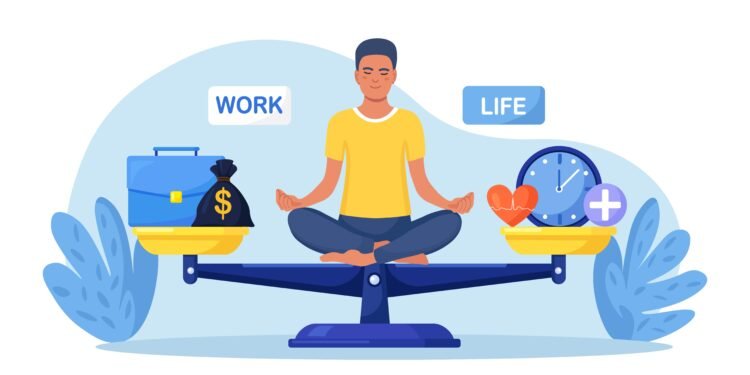In today’s fast-paced world, the demands of a sales and marketing role can be relentless. Achieving success in this competitive field often requires long hours, constant adaptability, and unyielding dedication. While this dedication is commendable, it can also take a toll on one’s personal life and well-being. In this blog, we will explore the challenges of balancing work and personal life in a demanding sales and marketing role and provide valuable tips to help you maintain equilibrium and thrive in both areas.
The Challenge of a Demanding Sales and Marketing Role
Sales and marketing professionals are often on the front lines of an organization, responsible for driving revenue and growth. Their roles involve meeting and exceeding targets, fostering client relationships, and staying ahead of rapidly evolving market trends. In such an environment, the pressure to perform is high, and the boundary between work and personal life can easily blur.
Challenges to Work-Life Balance
- Long Working Hours: Sales and marketing roles often require long working hours, especially when you need to meet tight deadlines, attend client meetings, and work on marketing campaigns. It’s not uncommon for professionals in this field to find themselves working well into the evenings and even on weekends.
- Frequent Travel: Sales and marketing roles often involve extensive travel, whether it’s meeting clients, attending trade shows, or conducting market research. Frequent travel can disrupt personal routines and take a toll on family life.
- Stress and Pressure: The constant pressure to meet sales targets, generate leads, or launch successful marketing campaigns can be overwhelming. This stress can spill over into personal life, affecting one’s overall well-being.
- Technology’s Influence: The proliferation of smartphones and constant connectivity can make it challenging to switch off from work. The expectation to respond to emails and messages, even outside regular working hours, can hinder the separation of work and personal life.
- Uncertainty and Adaptability: Sales and marketing roles require professionals to stay agile and adaptable. This constant change and need for flexibility can make it difficult to maintain a structured personal life.
Strategies for Achieving Work-Life Balance
1. Set Clear Boundaries
Establish clear boundaries between work and personal life. Define specific working hours and communicate them with colleagues, clients, and supervisors. Avoid the temptation to check work emails or messages outside of these hours unless it’s an absolute necessity.
2. Prioritize and Delegate
In a demanding role, not everything can be a top priority. Identify the most crucial tasks and focus your efforts on them. Delegate less critical tasks to team members when possible to alleviate your workload.
3. Time Management
Effective time management is crucial for maintaining work-life balance. Use tools like calendars and to-do lists to plan your work and personal tasks. Allocate specific time slots for both work and leisure activities, and stick to the schedule.
4. Use Technology Wisely
While technology can blur the line between work and personal life, it can also help you achieve a better balance. Use productivity apps to manage your work efficiently and set up automated responses for non-urgent emails during your off hours.
5. Take Breaks
Don’t neglect the importance of breaks during the workday. Short breaks can help you recharge and be more productive. Whether it’s a quick walk, a meditation session, or just a few moments of deep breathing, regular breaks are essential.
6. Learn to Say No
It’s okay to say no to additional tasks or meetings if your plate is already full. Over committing can lead to burnout and hinder your ability to maintain a healthy work-life balance.
7. Communicate with Your Employer
Open and honest communication with your employer is essential. Discuss your workload and any challenges you’re facing in achieving work-life balance. Many employers are willing to offer flexible work arrangements to support their employees’ well-being.
8. Prioritize Self-Care
Invest time in self-care activities that promote your physical and mental well-being. Regular exercise, a balanced diet, and adequate sleep are foundational. Additionally, mindfulness practices like meditation can help reduce stress and improve focus.
9. Unplug Occasionally
Take planned breaks from technology, such as social media and work-related apps. Disconnecting allows you to be more present in your personal life and reduces the constant stress of notifications.
10. Build a Support System
Lean on your support network, whether it’s your family, friends, or colleagues. Share your challenges and seek their advice and assistance when needed. A strong support system can help you navigate the demands of your role more effectively.
Conclusion
Balancing work and personal life in a demanding sales and marketing role is a challenge, but it’s crucial for your overall well-being and long-term success. By setting boundaries, prioritizing tasks, managing your time effectively, and taking care of your physical and mental health, you can strike a balance that allows you to excel in your professional life while enjoying a fulfilling personal life. Remember that achieving work-life balance is an ongoing journey, and periodic reassessment and adjustment of your strategies may be necessary. In the end, it’s about finding what works best for you and your unique circumstances, so you can thrive in both your career and personal life.


















